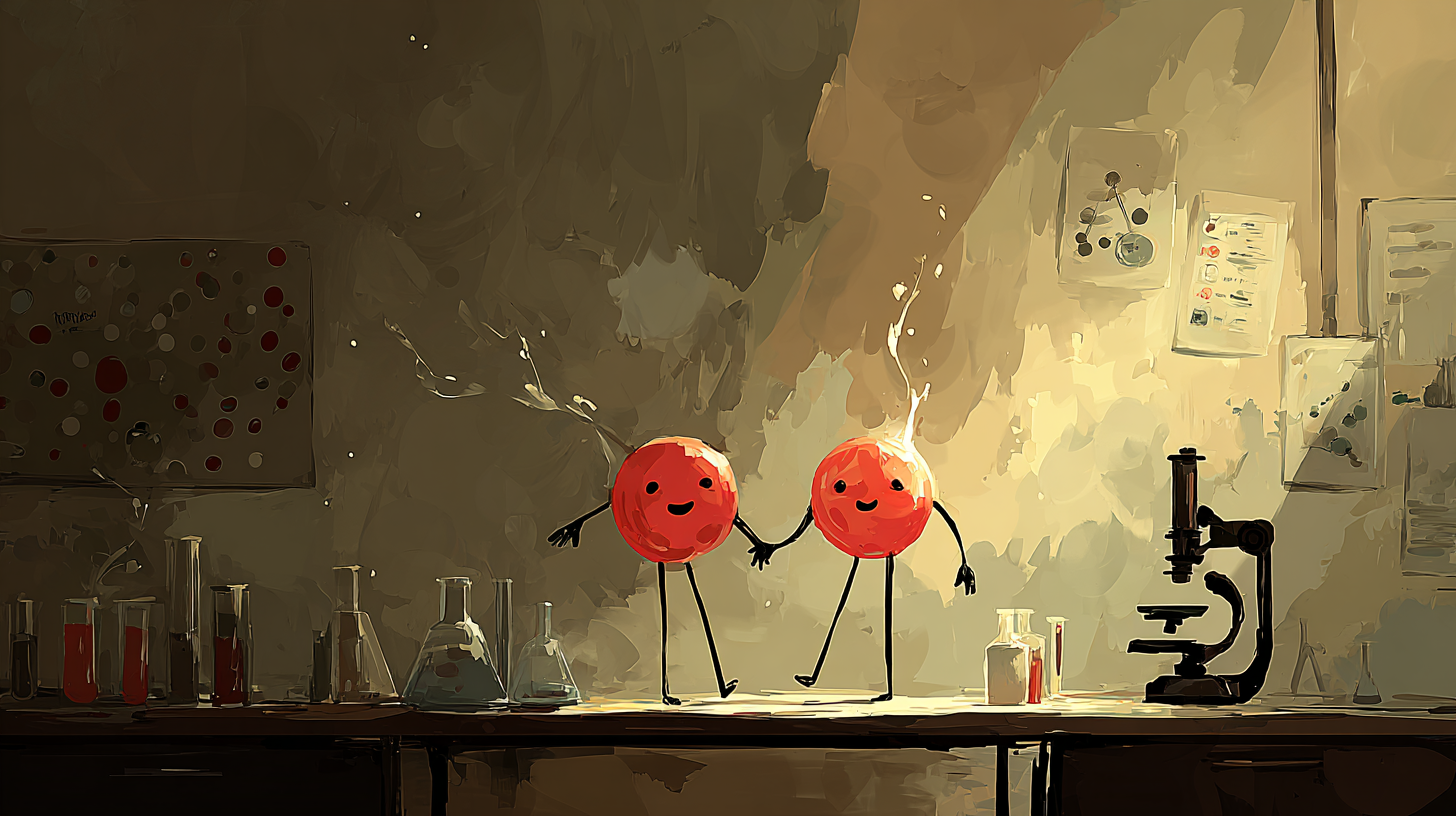A molecule is a very tiny piece that makes up everything.
物を作るすごく小さなかけらのこと
以下は英単語 “molecule” に関するストーリー型学習コンテンツです。まずは大枠の意味を理解して最後の文章で確認しましょう。
「molecule」の主な意味(main meaning)
| 品詞 | 意味 | 発音記号 | 英語例文 |
|---|---|---|---|
| 名詞 | 分子(物質を作る最小の単位) | /ˈmɒlɪkjuːl/ | A water molecule consists of two hydrogen atoms and one oxygen atom. |
「molecule」の語源(etymology)
ラテン語の「molecula」(小さなかたまり)から派生
「moles(かたまり)」に指小辞「-cula」がついたもの
核イメージ:とても小さいけれど、全体を作る大切な単位
「molecule」の類義語(synonyms)
| 類義語 | 英語例文 |
|---|---|
| atom | An atom is the smallest part of an element. |
| particle | Dust is made up of tiny particles. |
| compound | Water is a chemical compound. |
| element | Hydrogen is the lightest element. |
| ion | An ion is an atom or molecule with a charge. |
「molecule」の反義語(antonyms)
| 反義語 | 英語例文 |
|---|---|
| whole | The whole cake was gone in minutes. |
| mass | The mass of the object was hard to move. |
「molecule」のコロケーション(collocations)
| コロケーション | 英語例文 |
|---|---|
| water molecule | A water molecule is made up of H₂O. |
| chemical molecule | Scientists studied the chemical molecule in the lab. |
| oxygen molecule | We breathe in the oxygen molecule from the air. |
| molecular structure | The molecular structure of DNA is complex. |
| molecule of gas | A single molecule of gas can move very fast. |
「molecule」の2項表現(binomials)
| 表現 | 英語例文 |
|---|---|
| atoms and molecules | Chemistry is the study of atoms and molecules. |
| protons and molecules | Protons and molecules play key roles in chemical reactions. |
英語ストーリー(english story)
Title: “A Tiny Discovery”
Emma was working in a small laboratory at her school. She loved science, especially chemistry. One day, her teacher asked the class to observe a molecule under the school’s new microscope. Emma was excited. She chose to look at a water molecule. “It’s made of two hydrogen atoms and one oxygen atom,” she said confidently.
Her best friend, Liam, asked, “How is a molecule different from an atom?” Emma explained, “An atom is a single building block, but a molecule is a group of atoms bonded together.”
They also talked about particles, elements, and compounds. “So water is a compound, right?” Liam asked. “Yes,” Emma replied. “And oxygen is an element. When oxygen and hydrogen atoms join, they form a water molecule.”
Later, they discussed the molecular structure of different materials. “DNA has a complex molecular structure,” their teacher added.
At the end of the class, the teacher said, “Remember, understanding atoms and molecules helps us understand the world.”
Emma smiled. Science was full of wonders—even in things too small to see.
和訳
タイトル:「小さな発見」
エマは学校の小さな実験室で働いていました。彼女は科学、特に化学が大好きでした。ある日、先生がクラスに新しい顕微鏡を使って*分子(molecule)を観察するように言いました。エマはわくわくしました。彼女は水の分子(water molecule)*を見ることにしました。「これは水素原子が2つと酸素原子が1つでできているんです」と自信を持って言いました。
親友のリアムが聞きました。「*原子(atom)と分子(molecule)*ってどう違うの?」エマは説明しました。「*原子(atom)*は一つの小さな部品で、*分子(molecule)*はそれが集まってできているんだよ」
彼らはまた、粒子(particles)、元素(elements)、*化合物(compounds)についても話しました。「じゃあ水って化合物(compound)なんだね?」とリアム。「うん、そうだよ」とエマ。「それに酸素は元素(element)で、水素と酸素が結びつくと水の分子(molecule)*になるんだ」
その後、彼らはさまざまな物質の*分子構造(molecular structure)*について学びました。「DNAの分子構造はとても複雑だよ」と先生が付け加えました。
授業の終わりに先生が言いました。「*原子(atoms)と分子(molecules)*を理解すれば、世界のことがもっとよくわかるんだよ」
エマはにっこり笑いました。科学は、目に見えないほど小さなものの中にも不思議がいっぱいでした。
「molecule」のQ&A
- Q分子(molecule)と原子(atom)の違いは何ですか?
- A
原子(atom)は物質を構成する最小単位で、分子(molecule)は複数の原子が結びついてできるものです。たとえば水は2つの水素原子と1つの酸素原子からなる分子です。
- Qparticle(粒子)とmoleculeの違いは何ですか?
- A
particleは非常に小さな物質のかけらを指す広い言葉で、molecule(分子)はその中でも特に原子が結合した単位を指します。つまり、すべての分子は粒子ですが、すべての粒子が分子ではありません。
- Qcompound(化合物)はmoleculeと同じ意味ですか?
- A
似ていますが、違いがあります。compoundは異なる種類の原子が結合した物質全体を指し、moleculeはその化合物の最小単位です。つまり、水は化合物であり、同時に水の分子です。
- Qwhole(全体)はなぜmoleculeの反義語になるのですか?
- A
molecule(分子)は「全体を作る小さな部分」を意味するので、それに対してwhole(全体)は「部分を集めた結果の全体」を指すため、意味が逆になります。
- Qmass(かたまり)はmoleculeとどう反対の意味になりますか?
- A
moleculeは非常に小さな単位を表しますが、massは大きな物質のかたまりを意味します。スケール(大きさ)の違いから反対の概念になります。
- Q「water molecule」という表現はどんな場面で使いますか?
- A
「water molecule(水分子)」は、科学の授業や研究で、水の構造を説明するときに使います。例えば「A water molecule consists of two hydrogen atoms and one oxygen atom.」のように使います。
- Q「molecular structure」はどういう意味ですか?
- A
「molecular structure(分子構造)」は、分子内で原子がどのように結びついているか、配置されているかを表します。化学の分野で物質の性質を理解するために使われます。
- Q「atoms and molecules」という表現はなぜよく使われるのですか?
- A
「atoms and molecules(原子と分子)」は、物質の基本単位をセットで説明するときによく使われます。科学の入門で「全ての物質は原子と分子でできている」と教えることが多いからです。
molecule / atom / particle / compound / element / ion の違い
| 単語 | 意味 | ニュアンス | 例文 |
|---|---|---|---|
| molecule | 原子が結合した最小単位 | 物質の基本構成要素 | A water molecule has two hydrogen atoms and one oxygen atom. |
| atom | 物質の最小単位 | 化学的に分割できない基本粒子 | An atom is the smallest part of an element. |
| particle | 微小な粒子 | 広い概念で、分子・原子・電子などを含む | Dust is made up of tiny particles. |
| compound | 異なる原子が結合した物質 | 化学的性質をもつ新しい物質 | Water is a chemical compound. |
| element | 同一原子で構成された物質 | 化学的に分解できない基本物質 | Oxygen is a natural element. |
| ion | 電荷を持つ原子・分子 | 電気的にプラスまたはマイナスの状態 | An ion carries a positive or negative charge. |



コメント